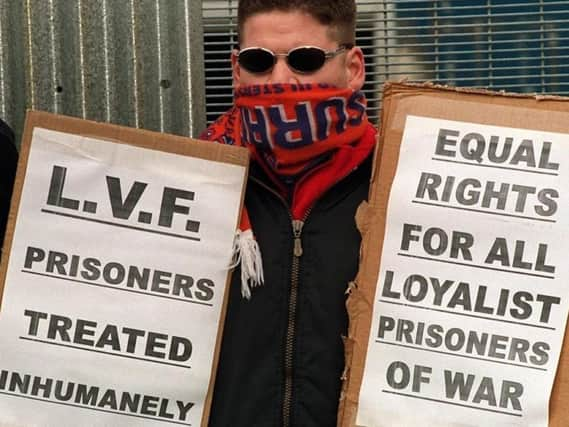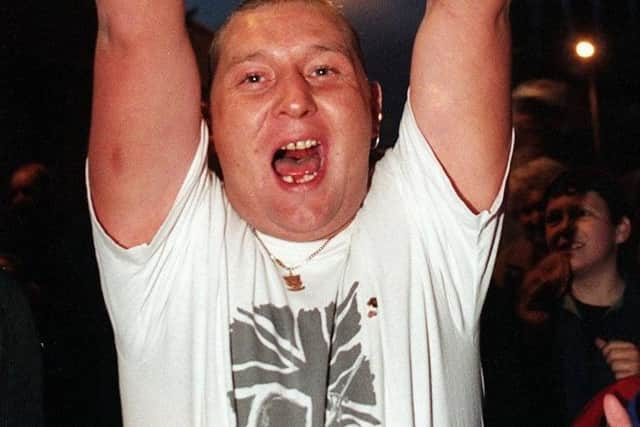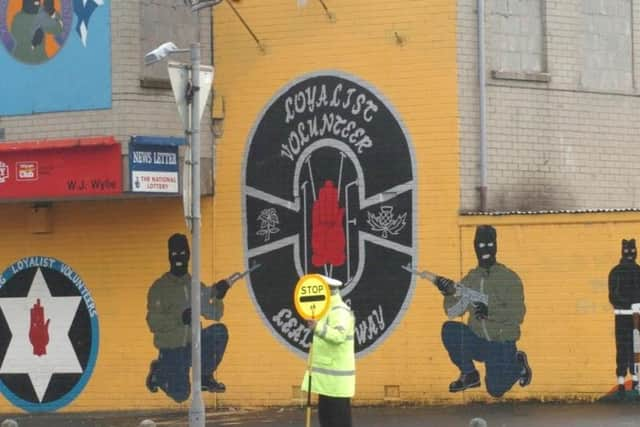LVF called end to campaign 20 years ago here is how it was born


Dr Edwards is author of the book ‘UVF: Behind the Mask’, and defence lecturer at the Royal Military Academy Sandhurst.
Here he tells the News Letter how the Portadown-based LVF was born, and what marked it out from the other groups.
Advertisement
Hide AdAdvertisement
Hide AdREAD ONE MOTHER’S ACCOUNT OF THE HUMAN COST OF ITS CAMPAIGN HERE: ‘I didn’t even know what the initials LVF meant’In the 1970s, the mid-Ulster UVF began to make a name for itself under “particularly vicious” men like Robin Jackson, Billy Hanna, and Wesley Somerville.


Billy Wright claimed to have joined the UVF in the wake of the 1976 Kingsmills massacre, served a jail term for firearm possession, and was freed in the early 1980s.
Despite a supposed religious conversion, he re-involved himself and by the early ‘90s had risen to be the mid-Ulster “brigadier”, replacing Jackson.
“The Mid Ulster UVF had about 200 members,” said Dr Edwards.
Advertisement
Hide AdAdvertisement
Hide Ad“They had a hard core of four gunmen. They had a small number around there who were acting as look-outs, disposing of weapons after they carried out killings, but Wright was one of that four, along with Mark Fulton who was effectively second-in-command. They’d have been responsible for the vast majority of killings in that area.”


Wright was known for being very ‘hands-on’, getting directly involved in a great deal of the murders, though exactly how many is hard to say.
Whilst he had initially accepted the 1994 ceasefire, within a year he had “turned his back” on the UVF’s Shankill Road-based leadership amid fears that too many compromises were being made to republicans.
It expelled him in 1996 due to actions such as the McGoldrick killing, and his comrades in the mid-Ulster UVF largely left too – becoming the LVF.
Advertisement
Hide AdAdvertisement
Hide AdSympathetic hardliners in places like Belfast and east Antrim also pledged allegiance, creating a “group of satellites orbiting Planet LVF”.
Things began to fall apart when Wright was shot dead inside the Maze prison by the INLA in December 1997, ending the “cult” of personality which had driven the group.
Nevertheless, it continued to stagger on, with members carrying out killings far after its campaign was officially supposed to have ended.
As to what marked out the LVF from other murder groups, Dr Edwards said: “The principal challenge levelled by the LVF was not its threat to the security to the people of Northern Ireland. It was to the peace process.”
Advertisement
Hide AdAdvertisement
Hide AdHe said during 1997, the LVF actually killed fewer people than the mainstream loyalist groups which were supposedly on ceasefire.
Rather, the main danger of the group was that, at a critically-sensitive time, it “represented an alternative view of how loyalists should ‘bargain’ or ‘lobby’ government”.
He concluded: “I think they posed an armed challenge to the peace process from the loyalist side, and it was the last armed challenge posed by those who did not support the peace process within loyalism.”
END TO CAMPAIGN DECLARED... BUT LVF’S WORD WAS NOT TO BE TRUSTED:
Advertisement
Hide AdAdvertisement
Hide AdOn the night of August 8, 1998, the BBC reported that the LVF had declared a “complete” end to its campaign.
It quoted a statement which said: “Irrespective of whether or not republicans recognise the English dictionary, for LVF personnel the meaning of the word complete is quite clear.
“The word means: entire, whole, brought to an end, perfect, absolute, utter, finished.”
The Irish Times also quoted the same statement.
The BBC went on to add that Mo Mowlam, the then-Northern Ireland Secretary, had said she “welcomes the statement by the LVF that the war is over”.
Advertisement
Hide AdAdvertisement
Hide AdThe BBC’s correspondent Gary Duffy added that “LVF pronouncements often greeted with scepticism”.
This was a sentiment echoed in the News Letter itself.
An archived online copy of a story from August 10, 1998, said “the group is regarded as so unpredictable and ill-disciplined that the statement may not be enough”.
And as the list below shows, whilst its violence petered out, killings did continue for years.
PRECISE LIST OF VICTIMS HARD TO COMPILE:
Working out just how many people were murdered by the LVF is difficult because of the blurring of the line between the UVF and LVF, use of covernames, and disintegration of the group’s leadership.
Advertisement
Hide AdAdvertisement
Hide AdFor example the Conflict Archive on the Internet, run by NI’s two universities, does not include Mr McGoldrick as an LVF victim, instead attributing his death to the UVF.
It lists 18 LVF killings up to 2001, namely:
• May 13, 1997: Sean Brown, 61, Catholic civilian found shot in burning car, Randalstown
• July 15, 1997: Bernadette Martin, 18, Catholic civilian, died after a loyalist crept into house as she slept and shot her in the face, Aghalee
• July 27, 1997: James Morgan, 16, Catholic civilian, found beaten to death in field, near Castlewellan
Advertisement
Hide AdAdvertisement
Hide Ad• December 5, 1997: Gerry Devlin, 36, Catholic civilian, shot outside GAA club in Glengormley, Newtownabbey
• December 27, 1997: Seamus Dillon, ex-IRA, shot at a hotel near Dungannon
• January 10, 1998: Terry Enright, 28, Catholic civilian, shot Space nightclub, Belfast
• January 18, 1998: Fergal McCusker, 28, Catholic civilian, found shot behind youth centre, Maghera
Advertisement
Hide AdAdvertisement
Hide Ad• January 23, 1998: Liam Conway, 39, Catholic civilian, shot while sitting in a mechanical digger, Belfast
• January 24, 1998: John McColgan, 33, Catholic civilian, taxi driver, shot in Belfast
• March 3, 1998: Damian Trainor, 26, Catholic civilian, & Philip Allen, 34, Protestant civilian, shot during attack on Railway Bar, Poyntzpass
• March 15, 1998: David Keys, 26, LVF, strangled in cell
• April 21, 1998: Adrian Lamph, 29, Catholic civilian, shot Portadown council depot
Advertisement
Hide AdAdvertisement
Hide Ad• April 25, 1998: Ciaran Heffron, 22, Catholic civilian, shot as he walked in Crumlin
• June 5, 1999: Elizabeth O’Neill, 59, Protestant civilian, killed in bombing of her home, Portadown
• Jan 10, 2000: Richard Jameson, 46, UVF, shot Portadown
• May 26, 2000: Martin Taylor, 35, UVF, shot Belfast
• April 11, 2001: G. Marks, 37, UVF, shot Tandragee
The list is not exhaustive. For instance, it lists journalist Martin O’Hagan, shot on September 28, 2001 in Lurgan, as claimed by the ‘Red Hand Defenders’, but the LVF is understood to have killed him.
LVF involvement is also suspected in the 2003 death of loyalist Jim Johnston and disappearance of civilian Lisa Dorrian in 2005.